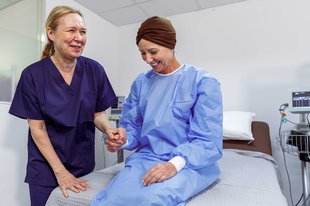Hereditary cancer information for healthcare professionals

Doctors
Ovarian cancer is the sixth most common cancer in women in the UK, with around 7,500 women diagnosed every year. It is classified as a rare disease and, on average, a GP will only see one case every five years. If you provide treatment and care for people living with ovarian cancer, we have information and resources to support you to deliver the best care to your patients.
Ovarian cancer symptoms and diagnosis
Tests should be carried out in primary care if a woman (especially if 50 or over) reports having any of the following symptoms on a persistent or frequent basis more than 12 times per month:
- Persistent abdominal distension (‘bloating’)
- Feeling full (early satiety) and/or loss of appetite
- Pelvic or abdominal pain
- Increased urinary urgency and/or frequency
Ovarian cancer symptoms might also include indigestion, back pain, changes in bowel habits (going more often or a lot less), unexplained weight loss, post-menopausal vaginal bleeding, and extreme tiredness for no obvious reason.
Ovarian cancer is often misdiagnosed as irritable bowel syndrome (IBS). IBS diagnosis is most prevalent in people in their 20s and 30s. If a woman over 50 years of age presents with a new onset of IBS-like symptoms, it may be a sign of a serious disease, and it is important that ovarian cancer is considered as a differential diagnosis.
Ovarian Cancer Action has developed resources to support the detection and diagnosis of ovarian cancer:
- Ovarian cancer information guide for healthcare professionals
- Quick reference guide to NICE clinical guidelines for detecting and diagnosing ovarian cancer.
NICE guidelines covering the referral pathway and standards of care:
- The NICE clinical guideline (CG122) for Ovarian Cancer: recognition and initial management covers the referral pathway for women with suspected ovarian cancer and the first line of treatment.
- The NICE quality standard (QS18) Ovarian Cancer covers the recognition and initial management of ovarian cancer and the high-quality standard of care.
Hereditary ovarian cancer
Sometimes inherited genes have small changes which are known as a genetic fault or genetic mutation. Up to 20% of epithelial ovarian cancer occurs because of a genetic fault which has been passed down from one or both parents. It is important to identify patients who are at high risk of developing ovarian cancer so that steps can be taken to reduce their risk.
- The NICE clinical guideline (CG164) for Familial breast cancer: classification, care and managing breast cancer and related risks in people with a family history of breast cancer covers care for people with a family history of breast, ovarian or other BRCA-related cancer. It describes strategies to reduce the risk of and promote early detection of breast and ovarian cancer (including genetic testing). It also includes advice on treatments and risk-reducing surgery.
- The Clinical Commissioning Policy: Genetic Testing for BRCA1 and BRCA2 Mutations outlines the commissioning and funding of BRCA1 and BRCA2 genetic testing service in England.
- The Scottish referral guidelines for suspected cancer aim to facilitate appropriate referral between primary and secondary care for patients whom a GP suspects may have cancer. The guidelines should help to identify those patients who are most likely to have cancer and who therefore require urgent assessment by a specialist.
Supporting your patient
We provide information and signposting for patients to support them from diagnosis, treatment, recovery and beyond. Find practical and financial information and support, advice around how to live well with cancer. Our stories are from people and their families living with ovarian cancer, is a useful resource for hearing other people’s experiences with diagnosis and treatment.
Our Hereditary Cancer Hub contains everything a patient needs to know about the two most common genetic faults that raise the risk of ovarian cancer (BRCA1 and BRCA2, and Lynch syndrome), including entitlement to testing, implications of having a genetic fault and information on things such as risk-reducing surgery and fertility options. Our Hereditary cancer Risk Tool can support your patients to assess their likelihood of having inherited the BRCA gene fault or Lynch syndrome based their family history.
If you have patients worried about ovarian cancer or are living with ovarian cancer, or you want to raise awareness, we have a number of resources for you.
Patient leaflets:
- Ovarian cancer symptoms
- Ovarian cancer symptoms diary
- Ovarian cancer – what you need to know
- A younger woman’s guide to ovarian cancer
Posters:
Translated Videos (Genetic Testing):
As part of IMPROVE UK and in collaboration with Sandwell and West Birmingham NHS Trust, and Cancer Research UK Cambridge Centre, we've hosted videos about genetic testing for ovarian cancer patients, which were created with patients from Birmingham and Cambridge. Each video has been translated into Bengali, Polish, Punjabi, Romanian and Urdu.
Please find links to the video playlists below:
We also have a range of written resources translated here.
If you would like to order hard copies of these materials, please email info@ovarian.co.uk.
Telephone support for patients:
Some cancer charities run telephone support lines that offer emotional support and advice where patients can speak to someone anonymously over the phone:
- Chai Cancer Care provides free, professional and expert support to any member of the Jewish community affected by cancer, as well as their family and friends. Call 0808 808 4567
- Macmillan Cancer Care offer confidential support to people living with cancer and their loved ones. Call 0808 808 0000
- Maggie's offer free support for anyone with cancer and their families. Call 0300 123 1801
- Ovacome supports anyone affected by the disease, including family members, those at risk, and healthcare professionals. Call 0800 008 7054
Reviewed: Feb 2023